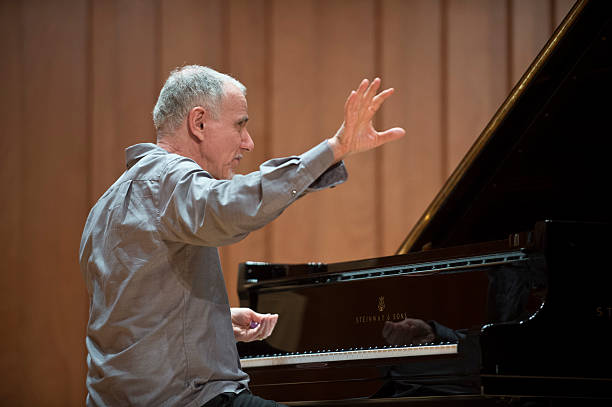27.05. – Happy Birthday !!! Born 1948 in Philadelphia, Marc Copland began to study piano at the age of seven, but abruptly stopped at age ten when his local school suggested that he take up the alto saxophone.
On alto, Copland participated actively in Philadelphia’s music scene in the early 1960’s, hanging out and playing with his friends Michael Brecker and Eric Gravatt. In 1965 he studied harmony briefly with local composer Romeo Cascarino, as well as composition with Meyer Kupferman and saxophone with Joe Allard, the latter two both in New York city.
In 1966, Copland moved to New York to study at Columbia University. He hung out in the music scene there, which was in the process of spreading out from the clubs into lofts throughout the city. Along with John Abercrombie and Glen Moore, he was part of the Chico Hamilton Quartet. He began to experiment with electronics attached to his horn on the album Friends, with Abercrombie, Clint Houston, and Jeff Williams. The disc received a 5-star review from Down Beat magazine, and little by little it attracted a cult following.
Piano: Copland was writing music with chords that were more and more complex, which seemed to him to require an approach different from what he was able to do on saxophone. In 1973, he decided to switch to the piano.
During the following decade, Copland began his career as pianist in Washington, DC. He became a fixture in “house” trios in local clubs, accompanying musicians such as Randy Brecker, Bob Berg, Art Farmer, Curtis Fuller, Tom Harrel, David Liebman, and Gary Peacock. He also appeared with his own groups, which included local area musicians.
In the early 1980’s, Marc Copland returned to New York as a pianist. He worked with Joe Lovano, Herbie Mann, James Moody, and John Scofield,as well as with his own groups. Learning that the Japanese label Jazz City was looking for ten American pianists, Copland sent a cassette to guitarist and producer Yoshiake Masuo. His submission was first rejected, as Masuo explained that the label had already found the ten pianists necessary. But some weeks later, after one of the ten pianists dropped out, Masuo called Copland back and offered him his first recording as leader, My Foolish Heart, in 1988. Copland recorded two other albums for the label, All Blues At Night (1992) and Songs Without End (1994). His concerts as a leader became more frequent, and he began touring with Gary Peacock and Bill Stewart, and later with Billy Hart.
On the recommendation of Peter Erskine and John Abercrombie, Copland participated in a large recording project with composer Vince Mendoza, where he met producer Takao Ogawa. This chance encounter with Ogawa resulted later in the 1995 recording and release of Stompin with Savoy, with an all-star quintet including the pianist’s friends from NYC, Philadelphia, and Baltimore—Randy Brecker, Bob Berg, and Dennis Chambers. Since his previous Japanese albums had poor distribution, this Savoy disc effectively became his first American release. The American critics took notice, and Copland toured throughout the USA with this band for three years.
In 1990 Copland began touring Europe, at first in duo with Abercrombie, and later in trio and quartet.
Several independent European labels began to show an interest in his work.
Europe: In 2001, the french producer Philippe Ghielmetti heard Copland in Paris with his trio, and invited him to record his first solo album, Poetic Motion. The tunes on the album, almost all by Copland, are constructed around the poem of Bill Zavatsky. Three years later Copland recorded in solo again, this time with the Swiss label Hatology (Time Within Time, 2005). These albums allowed Copland to showcase his unique approach to music.
He recorded in duo with Bill Carrothers, Tim Hagans, Vic Juris, David Liebman, Greg Osby, and Gary Peacock, helping to bring back into vogue a setting that had not been widely used for some time.
But it was Haunted Heart and Other Ballads (Hatology, 2001), recorded with his regular trio of Drew Gress (bass) and Jochen Rueckert (drums), that helped open the door to wider recognition by the public.
He recorded also with various quartets, including musicians such as Michael Brecker, Randy Brecker, Drew Gress, Billy Hart, David Liebman, Tony Martucci, and others.
Beginning in 2005, Copland recorded several discs with the German label Pirouet, including the acclaimed New York Trio Series.
Beginning in 2013, Copland recorded for the German label ECM with the quartet of John Abercrombie and the trio of Gary Peacock.
In 2015 Copland launched his own label, innerVoice Jazz. The first two of his releases, Zenith and Better by Far, were in quartet (Ralph Alessi, Drew Gress, Joey Baron). In October 2017 he released his first solo recording in several years, Nightfall, featuring compositions by Copland; guitarists John Abercrombie and Ralph Towner; and bassists Scott La Faro and Gary Peacock.







More Stories
CD review: George Benson – Dreams Do Come True: When George Benson Meets Robert Farnon – 2024: Video, CD cover
The band was tight as ever. The Warren Haynes Band cuts loose: Video, Photos
Interview with Alvin Queen: Feeling Good – I heard these tunes played by … Video, new CD cover, Photos